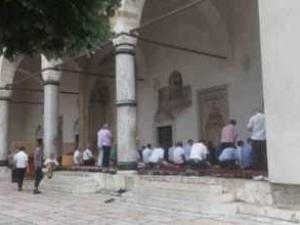Short Description
Amid series of media reports spreading misconceptions about Bosnian Muslim youth, young Muslims have denounced claims that their villages have become a hotbed for recruiting ISIL members, asserting that they reject the deviated teachings by the militant group.
Amid series of media reports spreading misconceptions about Bosnian Muslim youth, young Muslims have denounced claims that their villages have become a hotbed for recruiting ISIL members, asserting that they reject the deviated teachings by the militant group.
“It’s the law of the strongest. The media have the right to say whatever they want about us and we cannot do anything about that. They call us terrorists to tarnish the image of Islam,” Edis, a resident of Gornja Maoca, told Gulf News in frustration.
He then used quotes from the Qur’an: “Produce your proof if you are truthful. But where is their proof? As soon as the tension goes down in the country, they try to increase it again.”
Edis is one of the few residents in the Bosnian village of Gornja Maoca who accepted to speak to media men after losing faith in journalists.
His village, like small communities spread across Bosnia, have been at the centre of a string of controversies in the national and international media, claiming that they serve as recruiting grounds for terrorists.
The latest bout came in July 2015, when the British Daily Mirror alleged that Ošve village ‘has been used for Daesh training camps and could be a base for devastating terror attacks on the West.’
“We think Daesh has deviated from mainstream Islam,” he says in a mixture of Arabic, Bosnian and English.
“There are hundreds of isolated villages like Maoca in Bosnia, there is nothing special about us, really,” another Gornja Maoca resident who wished to remain unanimous revealed.
The claim was also denied in 2014 by the Mufti of Sarajevo at the entrance of Sarajevo’s 15th century bazaar.
“The issue of radicalism in Bosnia is often blown out of proportion and used for political purposes to portray Bosnia as a threat to Europe and a breeding ground for terrorism,” he said.
“They make a very limited phenomenon appear much bigger than it actually is,” he said.
Dismay
Many Bosniaks are frustrated by the constant hype in the media reports which try desperately to link Bosnia with ISIL.
“Everyone seems to have an interest in depicting Bosnia’s Muslims as terrorists,” a friend from Kozarac put bluntly.”
“I consider the biggest threat for peace and stability in Bosnia and Herzegovina to be the economic crisis, a world-wide economic crisis that has deeply affected our country,” Bosnia’s Minister of Defence, Marina Pendeš, told Gulf News.
She explained further that post-war Bosnia has an incredibly inadequate legislative system that prevents it from operating as a fully functional state.
On the other hand, some saw the phenomenon of linking Bosnian Muslims to terrorism as creating more rooms for politician who wish to play the nationalist card.
As unemployment soars above 60% among the youth and averages 43% among the active population, the vast majority of Bosnians from all walks of life happen to agree.
“Nationalism is definitely a bigger threat than radicalism in Bosnia,” Professor Jasmin Jahić, Vice Dean at the Faculty of Criminalistics, Criminology and Security Studies at Sarajevo University.
Bosnia has taken measures to combat radicalism by introducing new laws that punish anyone who leave and fight in a foreign war, he added.
“However, to this day, publicly glorifying the [Serbian] Chetnik or the [Croatian] Ustasha movement isn’t punishable, nor is denying the genocide in Srebrenica.”
In 1995, Dayton peace accord ended the war by splitting Bosnia into two ethnically-based autonomous regions, the Muslim-Croat federation and the Serb Republic.






![نصيحتي لك: اذكر الله [1 / 12] نصيحتي لك: اذكر الله [1 / 12]](https://islamstory.com/images/upload/content_thumbs/1913613138ragheb-al-serjany-videos.jpg)


Comments
Send your comment